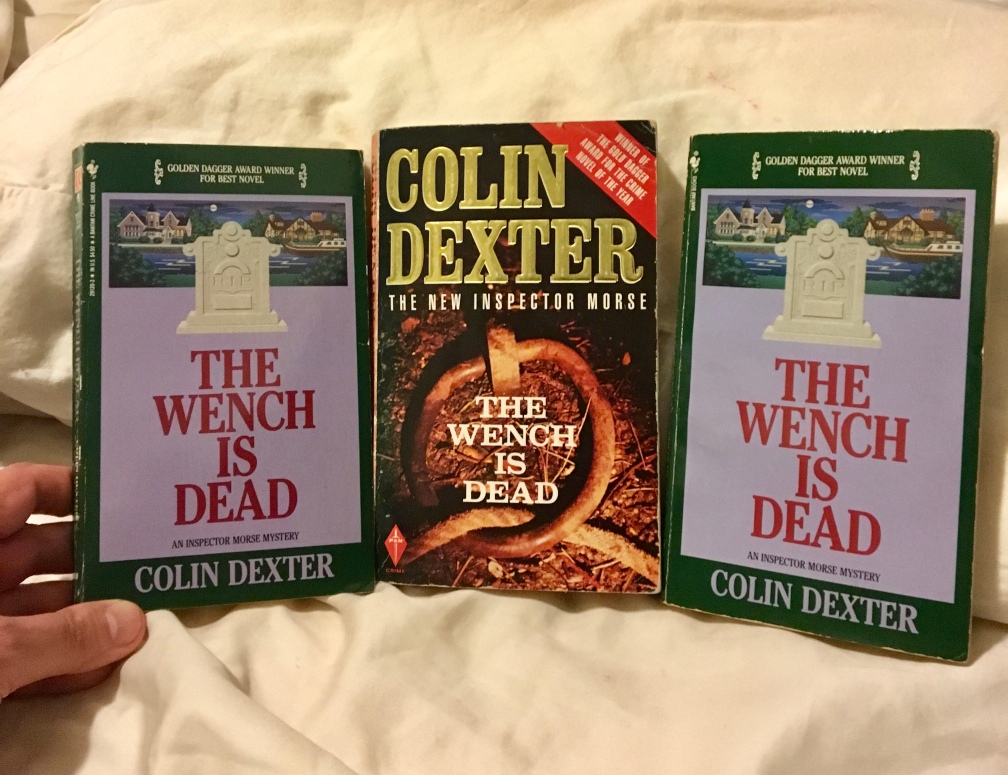
Colin Dexter obit in the Guardian by Dennis Barker.
—
My mother introduced me to most of my early crime fiction favorites including Inspector Morse. Colin Dexter created a wonderful world, a perfect riff on the tradition of the British “cozy.” The erudite voice of the author is consistently charismatic; as male domestic comedy, the team of Morse and Sergeant Lewis rival Nero Wolfe and Archie Goodwin; unlike most successful franchises Dexter didn’t continue past a natural conclusion (after a dozen books, Morse’s drinking and smoking took its final toll). The only false note in the development of the beloved characters was not problematic, only amusing: Dexter gave Morse a Jaguar and changed him to look like John Thaw (not to mention taking a few years and pounds off Lewis) after the phenomenal success of the television show.
I avidly read the whole series as a teenager into early adulthood but these days I regrettably see the flaws. The near-lurid interest in the sex lives of dead teenage girls may have been edgy at the time but now seems like an inappropriate cliché. Perhaps even more distracting is how the plots go quite a bit beyond byzantine into ludicrous. How many false solutions can the murder of a college don really have?
Still, I will always have a soft spot for these stories, mainly because the author has such marvelous command of language. Unlike most mysteries, one can finish a Dexter book with the feeling that you just got a bit smarter. A classical education was the source of Morse’s taste in music and poetry. Persnickety but practical lessons in spelling and grammar were presented with entertaining flair, but not all of the teaching was highbrow. When I was a drinker, I liked to emulate Morse by sauntering through the doors of a pub in England and ordering a “large Bell’s” (something that you simply can’t do in America).
Dexter was a celebrated creator of fiendishly difficult crossword puzzles, and in most of the books Morse timed himself solving the latest newspaper cryptic. A peak of the series, The Way Through the Woods, is driven almost entirely by a crossword problem. The author was also a devoted student of history, an attribute displayed to the fullest in the virtuosic The Wench is Dead.
The best crime fiction establishes location. It’s impossible to imagine Hammett, Chandler, and Ross Macdonald without California. Lawrence Block is the bard of New York, Elmore Leonard is the poet of Detroit. Agatha Christie couldn’t have existed without a manor just outside the limits of a small English town.
I’ve barely been to Oxford but feel like I know it well thanks to Morse and Dexter. I admit three copies of The Wench is Dead is excessive — especially since I can’t find on my shelves even one copy of the moody and haunting Service of All the Dead — but since I seem to be in the habit of buying yet another edition to read on a train or plane it was the obvious nominee to supply some local scenery. Here’s the perfect bit, from Chapter 34:
Morse left his flat in mid-morning and posted his single letter. He met no one he knew as he turned right along the Banbury Road, and then right again into Squitchey Lane; where, taking the second turning on his left, just past the evangelical chapel (now converted into a little group of residences) he walked down Middle Way. It was a dark, dankish morning, and a scattering of rooks (mistaking, perhaps, the hour) squawked away in the trees to his right. Past Bishop Kirk Middle School he went on, and straight along past the attractive terraced houses on either side with their mullioned bay-windows – and, on his left, there it was: Dudley Court, a block of flats built in cinnamon-coloured brick on the site of the old Summertown Parish Cemetery. A rectangle of lawn, some fifty by twenty-five yards was set out behind a low containing wall, only about eighteen inches high, over which Morse stepped into the grassy plot planted with yew-trees and red-berried bushes. Immediately to his left, the area was bounded by the rear premises of a Social Club; and along this wall, beneath the straggly branches of winter jasmine, and covered with damp beech-leaves, he could make out the stumps of four or five old headstones, broken off at their roots like so many jagged teeth just protruding from their gums. Clearly, any deeper excavation to remove these stones in their entirety had been thwarted by the proximity of the wall; but all the rest had been removed, perhaps several years ago now – and duly recorded no doubt in some dusty box of papers on the shelves of the local Diocesan Offices. Well, at least Morse could face one simple fact: no burial evidence would be forthcoming from these fair lawns…
He walked past Dudley Court itself where a Christmas tree, bedecked with red, green, and yellow bulbs, was already switched on; past the North Oxford Conservative Association premises, in which he had never (and would never) set foot; past the Spiritualist Church, in which he had never (as yet) set foot; past the low-roofed Women’s Institute HQ, in which he had once spoken about the virtues of the Neighbourhood Watch Scheme; and finally, turning left, he came into South Parade, just opposite the Post Office – into which he ventured once a year and that to pay the Lancia’s road-tax. But as he walked by the old familiar land-marks, his mind was far away, and the decision firmly taken. If he was to be cheated of finding one of his suspects, he would go and look for the other!